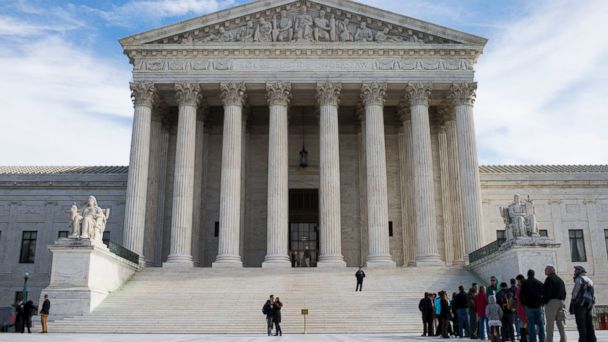3 Questions Facing the Supreme Court in Contraception Case

Credit: Bill Clark/CQ Roll Call/Getty Images
Regulations implementing the law require most group health plans to cover FDA approved contraceptives at no cost.
Paul D. Clement, a lawyer for Hobby Lobby, an arts and crafts chain, and Conestoga Wood, a maker of cabinets, will tell the justices that the contraceptive mandate forces his clients to either violate their faith or pay crippling fines.
At the core of the challenge is a federal law designed to protect religious liberty. It's called the Religious Freedom Restoration Act (RFRA) and it prohibits the government from burdening a person's exercise of religion unless the burden represents the least restrictive means of advancing a compelling interest.
That legalese translates into three main questions before the Court:
1. WHO IS ALLOWED TO BRING SUIT?
Or is a corporation a "person" exercising religion?
GOVERNMENT SIDE: Solicitor General Donald B. Verrilli Jr. argues that for-profit corporations like Hobby Lobby (owned and operated by the Green family) cannot be considered a "person" exercising religion under RFRA.
He says the Greens' beliefs "although deeply held" do not justify an exemption for Hobby Lobby to comply with a generally applicable law that regulates the corporation and not the individual owner.
Caroline Mala Corbin, a law professor at University of Miami School of Law, agrees and adamantly states that for-profit corporations cannot exercise religion.
"They are not sentient, they have no soul, and they certainly don't have a relationship with God," she says.
Could the Green family challenge the contraceptive-coverage provision in their individual capacity as shareholders of a closely-held company? Verrilli says no.
He says the contraception mandate imposes no personal obligations on the Greens, it only regulates "the corporations they own and the group health plan the corporations sponsor".
Aaron M. Katz, a litigation partner at Ropes & Gray LLP, sides with the government on this point.
"The Supreme Court should not allow a for-profit, secular corporation to avoid an important health care regulation simply because the corporation's shareholders believe that the regulation contradicts their personal religious beliefs," he says.
CHALLENGERS: Not surprisingly, Clement disagrees. He says the word "person" is designed to include both natural persons (like the Greens) and corporations.
"The fact remains that the Greens exercise their faith through Hobby Lobby," he writes, "and those beliefs are entitled to protection under a statute that draws no distinction between natural or corporate persons."
Douglas Laycock, a law professor at the University of Virginia Law School, filed a brief in support of Hobby Lobby.
He says that the drafting history of RFRA and related legislation makes clear that Congress understood RFRA to protect "all persons, including for-profit corporations and their owners, when the owners can show a substantial burden on their exercise of religion."
2. DOES THE MANDATE SUBSTANTIALLY BURDEN THE FOR-PROFIT CORPORATION?
CHALLENGERS: Hobby Lobby and Conestoga Wood object to 4 of the 20 contraceptives required by the law because they say the drugs and devices risk "destroying a human embryo."
They argue that if they choose not to offer the contraceptives, or not to offer any health plan at all, they will be faced with "draconian penalties".
"A fine imposed for adherence to religious beliefs is as direct an obvious burden as one could imagine," Clement writes.
GOVERNMENT SIDE: Verrilli argues that the relationship between the corporations' claimed burden and the challenged governmental action is "too attenuated." He says that it is the plan participants and their dependents who decide which services to use, often in consultation with their doctors.
"Those decisions by independent third parties are not attributable to the employer that finances the plan or to the individuals who own the company, and the connection is too indirect as a matter of law to impose a substantial burden," Verrilli says.
3. DOES THE GOVERNMENT HAVE A COMPELLING INTEREST?
And is the mandate the least restrictive means to further the interest?
GOVERNMENT SIDE: Verrilli says the mandate is part of a comprehensive insurance scheme and serves the government's interest in public health and gender equality.
"Those interests are supported by a wealth of empirical data demonstrating that providing women access to contraceptives without cost-sharing has significant health benefits for them, and their children, and conversely, that financial barriers to such access can result in significant health problems," says Verrilli.
Elizabeth Wydra, of the Constitutional Accountability Center, has filed a brief in support of the government.
"Based on their personal religious beliefs, the individual owners of Hobby Lobby are trying to prevent the corporation's employees from obtaining an important health benefit to which they are entitled under the Affordable Care Act," she says. "This would be a radical departure from well-established precedent, as the Supreme Court has never granted a religious accommodation to a secular business that comes at the expense of its employees."
The government acknowledges that it has offered certain exemptions to houses for worship because, "there is a long tradition of protecting the autonomy of a church through exemptions of this kind."
CHALLENGERS: Clement seizes on the exemptions for houses of worship and others for grandfathered plans and says there is no way that the government can argue that the mandate is narrowly tailored because already so many Americans are exempted.
"The contraceptive coverage requirement presently does not apply to tens of millions of people," he writes.
Richard W. Garnett, a professor of Law at Notre Dame Law School, said it would be a mistake to view the challenges through a "political lens or in a partisan frame."
In an essay for Scotusblog, he writes: "We know that some employers-not many, but some; mostly religiously affiliated, but not all-have religion based objections to providing coverage that includes some of these services to their employees. Is there any good reason not to revise or implement the regulations in such a way that employees would receive the services in question via a mechanism or route that avoids the objection and accommodates the objectors?"